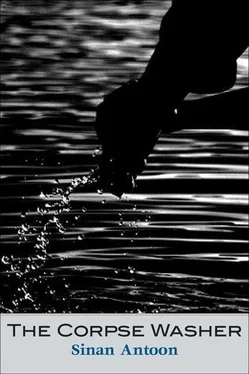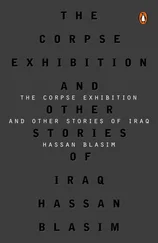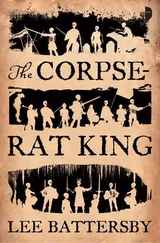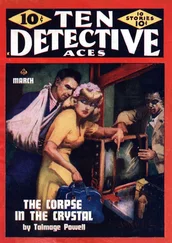We had agreed to meet at eight in the morning in front of the mghaysil. He straightened up when he saw me and moved away from the door. He greeted me with a smile and was a bit shy. I extended my hand and he shook it, calling me “Ustadh Jawad.” I told him that ustadh wasn’t necessary. I took the key out of my pocket and put it inside the lock to open the door. I thought to myself that he should be in school and not working with me — or with anyone else. He said that he had left school two years ago to support his family. He used to sell sandwiches and soft drinks, then worked with his uncle until his disappearance. His voice trembled as he mentioned the disappearance.
“Let’s hope he will come back,” I said, even though I had lost all hope. I wondered where Hammoudy’s body was now and what had been done to it. That unanswerable and haunting question pierced my heart again as I opened the door.
I hadn’t been to the mghaysil in a long time, and the smell overwhelmed me again. It’s strange how some places can retain the same smell for decades. That morning the scent of stale air mingled with the distinct mixture of humidity, camphor, and lotus. I told Mahdi to go in ahead of me, but he hesitated out of respect, so I pushed him gently by the shoulder. He went in and stood on the right, waiting. I closed the door behind us.
The morning light looked as if it had retreated outside. I saw the marble washing bench from afar. It was wet with darkness. The timid sun could smuggle only a few rays through the high window. I walked to the end of the corridor. I turned the ceiling fan on and then went to the side door, which led to the small garden where the pomegranate tree stood. I opened it to let some fresh air in. I asked Mahdi to open the window in the side room so the place could breathe in more fresh air. I looked outside and saw the pomegranates dangling down. The cool September air began to fill the place, and I changed my mind about taking off my jacket. I told Mahdi that he was welcome to pluck the pomegranates later and take them home.
“You don’t like them?” he asked.
“I do,” I said, “but not from this tree.”
I went to the cupboards and opened the doors. Everything was in its place just the way father used to have it. There were many bags of ground lotus leaves, but only a few camphor bags. I guessed that was why Hammoudy had gone to Shorja, but there was enough to last for the next few days. The white towels and shrouds were in their place, but the shrouds were packed in nylon bags and had supplications printed on them. There was plenty of cotton and bars of the olive colored soap, whose scent filled my nostrils. The pots and buckets were all neatly stacked.
I opened the faucet and the water gurgled, then came out in a rush. I stood at the washing bench and ran my fingers along its edges. It was as cold as the bodies that lie on it. I looked at my fingertips and saw the dust. I asked Mahdi to sweep the place. He went to the storage room to get the broom. I went to the side room. Everything was the same. The chairs, table, and the painting of Imam Ali right there next to the window. He had a yellow halo around his head with its green headdress. His eyebrows rose a bit and his brown eyes were darkened with kohl. The hair of his moustache and beard was wavy, and he was wearing a white shirt.
To the right of Imam Ali was a black-and-white photograph of Father, which Hammoudy must have put up. I asked my mother later where he had gotten the photograph and she said that he had asked for one to enlarge, but she had forgotten to tell me. In the photograph, Father had half a smile on his face and wore a white shirt with an open collar. I said to him: “ Here I am, back at the place you wanted me to inherit. I am taking your place, just as you took your father’s. But I am warning you, father, I will not be here for long. ”
I heard the broom scraping the floor and a few minutes later dust particles found their way to my nose. I sat on the chair and looked at Imam Ali’s picture again. I heard the voice of Muzaffar al-Nawwab clamoring in one of his poems where he addresses Ali: “ If you were to return now, your followers would fight against you and call you a Communist. ”
I took from my pocket the notebook in which, one summer many years ago, I had written down everything about washing bodies. Its pages had yellowed, but the cover was still intact. Sketches of my father’s face and his worry beads and Imam Ali’s face and the faces of other people filled the pages and framed the notes I’d taken. Those notes were now older than Mahdi. I read one of them. “Before washing, we say ‘I wash this corpse of this dead man as a duty and to seek God’s favor.’ During washing we must repeat: ‘Forgiveness, O Lord,’ or ‘O Lord, this is the body … etc.”’ I had written every little detail down in this notebook. Washing wasn’t difficult or complicated. I had watched my father do it hundreds of times and had helped him.
Mahdi finished cleaning and asked what he should do next. I asked him to close the windows and doors, because it was getting cold, and to go to the women’s mghaysil and get us some lotus and camphor just in case. He came back and stored the stuff in the cupboards, then stood at the door. I invited him to sit down. He took off his jacket and put it on the back of the chair. I wanted to get to know him better and asked him about his hobbies.
He said he loved soccer and played whenever he had a chance and that he wanted to be a professional player in the future.
“Why not?” I said and smiled. I pointed to his Barcelona jersey and asked whether he wanted to play for them.
“Yes,” he said excitedly.
“What about Iraqi teams?”
“I am a Talaba fan.”
I had stopped following the league, but told him that I was a diehard Zawra’ fan. “What position do you like to play?”
“Striker.”
Before we could chat any more, death knocked on the door. Mahdi got up and went to open it. My heart raced and I stayed in the chair for a few seconds. I heard Mahdi saying, “Yes, it’s here.” I got up, went and stood by the bench, then went to the corridor. Mahdi came back, followed by three men carrying a sheet hiding the dead man. Mahdi pointed to the washing bench and they laid the body there. He then pointed to me and told them, “Ustadh Jawad is the washer.” The sentence had a strange effect on my ears. As if Mahdi had decreed what I would be doing.
“My condolences,” I said. “What is he to you?”
“My nephew. My sister’s son.”
“May God have mercy on his soul. Can I see the death certificate?”
He asked one of the younger men with him to get it from the car. Mahdi started to fill the buckets with water. The man asked about the fees. I spontaneously repeated what my father used to say: “Whatever you can manage, plus the cost of the shroud, but later. The coffin is donated by the endowment, but we will deal with this later.”
“Fine,” he said.
I asked them to take a seat. The third man did so, but the deceased’s uncle stood still. The young man came back and handed the death certificate to the uncle, who gave it to me with some hesitation. I looked at it. “Full Name: Jasim Muhammad ‘Alwan. Sex: Male. DOB: 8-5-1982. Cause: Poisoning. Drug overdose/pills.”
I handed it back to him without a word. The dead man was only twenty-four and had died before his life had even started. Drugs had become rampant, especially among young men and teenagers. The young man who brought the death certificate went and sat on the visitors’ bench next to the other one.
I approached the washing bench and remembered that I had to take off my shoes and that I hadn’t brought slippers from home. I was a bit flustered. I went to the side room and took off my shoes and socks. I put my socks inside the shoes and hid them under the chair. I could feel how cold the floor was. I rolled up my sleeves and went back to the washing room and headed to the faucet. The water was bitterly cold. I washed my hands and arms with soap and dried them with a towel Mahdi had prepared.
Читать дальше












